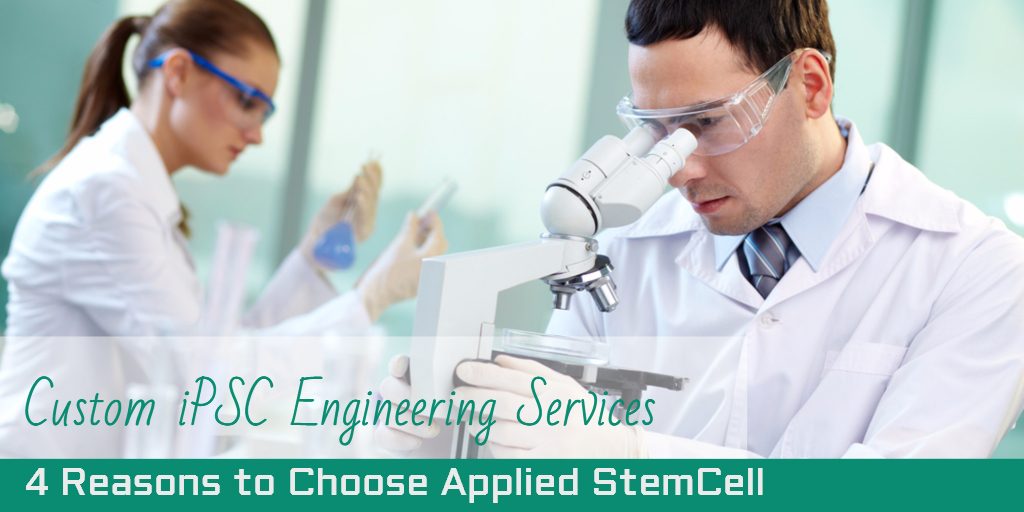Applied StemCell Inc. (ASC) is a gene-editing company that offers an optimized series of tools for basic research study, drug discovery, bio-processing, bio-production and preclinical applications. Currently, the company is focused on the following areas:
- Cell line generation for bio-production and bioassays
- Patient-relevant cell models for personalized medicine
- Physiologically predictive animal and cellular models of human disease
Applied StemCell uses its TARGATT™ technology to specifically insert a gene-of-interest at a well-characterized, transcriptionally active locus in the genome with guaranteed transgene expression. This site-specific knock-in technology was first established in mouse models, and ASC has successfully applied it to human cell lines.
ASC has leveraged this technology across various projects that combine the complementary CRISPR/Cas9 technology and TARGATT™ for highly specified transgene expression.
iPSC Disease Modeling Using CRISPR Genome Editing with iPSCs
Induced pluripotent stem cells (iPSCs) derived from healthy patients or those with injury or disease can be used in drug screening or disease research to help reduce source limitations, avoid genetic variation during studies, and overcome the bottleneck of gene editing in primary cells. For this reason, Applied StemCell offers its CRISPR/ Cas9 modified iPSC service for in vitro genetic disease modeling. Modified iPSCs can also be used in iPSC disease modeling for drug discovery and toxicology studies.
Importantly, Applied StemCell’s CRISPR-iPSC disease modeling program was highlighted in the article “CRISPR/Cas9 – transforming gene editing in drug discovery labs” (Comley, et al.), detailing the ability of its highly optimzed iPSC and CRISPR gene editing protocols to promote greater than 80% efficiency in engineering iPSCs.
The image below explains ASC’s CRISPR iPSC Genome Editing Service Platform.
Options for disease model iPSCs include, but are not limited to, phenylketonuria (PKU), amyotrophic lateral sclerosis (ALS), muscular dystrophy (MD), Type I or Type II diabetes. All iPSC disease models are validated with in vitro methods and in vivo with teratoma formation analysis.
4 Reasons Applied StemCell’s iPSC Genome Engineering Service is Unique
iPSC genome editing is a highly technical process and one that is best handled by a company with specialized expertise, validated protocols, patented technology, and a track record of success. There are four reasons why Applied StemCell’s iPSC Genome Engineering Service matches this description and is unique within the genome editing marketplace.
1. ASC Has Extensive Experience in Stem Cell and Genome Editing Technologies
The first and most important factor that differentiates Applied StemCell (ASC) is that the company started as a stem cell research company and remains one of the leading experts in stem cell technology.
ASC licensed rights to Yamanaka reprogramming factors from iPS Academia Japan, and also has the rights to use iPSCs as starting material for gene editing and differentiation. ASC is also a premier licensee of the CRISPR/Cas9 technology from the Broad Institute and one of the earliest providers of CRISPR genome editing services for engineering animal and cell line research models. Additionally, its proprietary TARGATT™ integrase-based genome editing platform is extremely efficient for site-specific knock-in of large transgene(s) into a preselected safe harbor locus.
It is Applied StemCell’s extensive experience in stem cell and genome editing technologies that researchers can leverage to their advantage.
2. Provides iPSC Genome Editing Services for Cell Lines from Healthy and Diseased Donors
In addition to providing expertise in stem cell and genome editing technologies, ASC can provide iPSC genome editing services for cell lines from healthy and diseased donors.
Importantly, ASC has a well-characterized human iPSC cell line (with teratoma formation analysis) that was reprogrammed from fibroblasts of a healthy donor and is very responsive to CRISPR-based genome editing. ASC also has well-optimized iPSC culturing and CRISPR transfection protocols that can be easily adapted to handling iPSCs from disease cell lines, as well as to improve efficiency in such hard-to-handle cell lines.
Using these tools, ASC offers services for gene knockout, insertion, replacement, gene correction, inducible gene expression and gene overexpression.
3. Applied StemCell’s Service Portfolio Accommodates Fully Customizable Deliverables for Customers
Additionally, ASC’s service portfolio accommodates fully customizable deliverables for customers, a common limitation among companies that have less experience with iPSC genome engineering.
ASC can provide:
- Custom heterozygous or homozygous clones (or both)
- Cell line engineering with or without silent mutations
- Footprint-free iPSC reprogramming and extensive pluripotency characterization including lineage specific marker staining, and teratoma analysis services at our in-house animal facility
- Terminal differentiation with functional assessments
To leverage Applied StemCell’s custom iPSC engineering services, clients can either provide their own source cells or iPSCs ( 1 x 106 cells), or they can choose a cell line within ASC’s iPSC catalog. ASC has starting material for genome-editing that is well-characterized and “consent free”. ASC will then genetically modifies the iPSCs according to the client’s specifications using CRISPR/ Cas9. Source cells can also be fibroblasts, PBMCs, or other biosamples.
Applied StemCell has optimized transfection and culture conditions for iPSC gene modification that provide the most efficient iPSC editing with highest success rate on the market.
This level of versatility is rare and valuable, because it is uncommon to be able to place an iPSC genome engineering order and have your precise needs accommodated.
4. Quality of Client Experience
Finally, Applied StemCell has extensive experience in CRISPR Genome Editing with iPSCs. It has executed custom projects for well-known clients. It operates with professional project managers. It provides high-resolution, publication-quality images.
ASC also creates detailed reports for every milestone, including:
- Milestone 1: Cell line validation (5 steps)
- Milestone 2: Targeting DNA vector construction and validation (3 steps)
- Milestone 3: Transfection of CRISPR/ Cas9 constructs (4 steps)
- Milestone 4: Cell confirmation and expansion (3 steps)
With a project timeline of 8-14 weeks, milestone reports are essential to both project management and the client experience. Clearly, ASC’s licensed CRISPR/Cas9 and iPSC technologies, alongside its genome engineering and stem cell expertise, give ASC a unique advantage over other companies.
